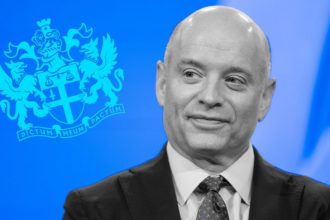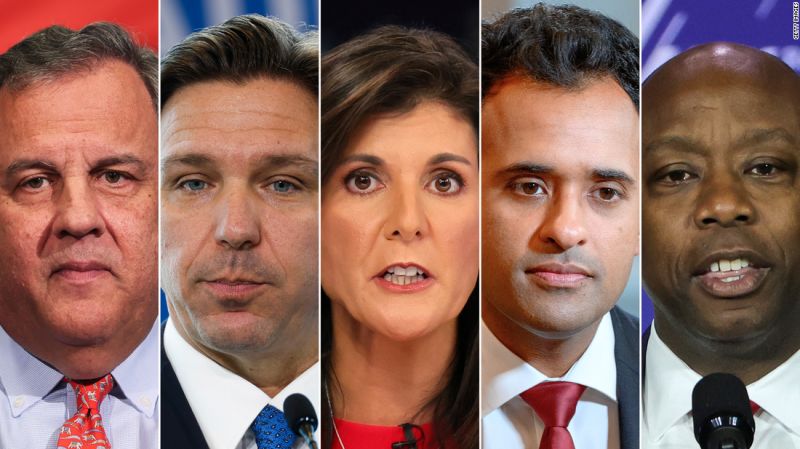The Republican presidential field is thinning two months out from the Iowa caucuses – and so is the once-crowded primary debate stage, which will feature only five candidates when they gather Wednesday night in Miami.
Former President Donald Trump will again be absent – of his own accord – having tried and failed to get the Republican National Committee to cancel the remaining debates in deference to his front-runner status. He won’t be far, though, on Wednesday, rallying supporters about 10 miles away in Hialeah.
The stage will feature Florida Gov. Ron DeSantis, former South Carolina Gov. Nikki Haley, former New Jersey Gov. Chris Christie, South Carolina Sen. Tim Scott and tech entrepreneur Vivek Ramaswamy – all of whom signed a pledge committing to support the eventual party nominee and met the donor and polling thresholds set by the RNC. North Dakota Gov. Doug Burgum and former Arkansas Gov. Asa Hutchinson fell short of qualifying.
Fewer candidates could mean a more substantive debate than the last time out, when the proceedings very quickly descended into a chaotic farrago of snappish cross-talk. It’s also possible that desperation will get the best of those onstage, as their opportunities to change the trajectory of the Republican primary campaign dwindle.
DeSantis and Haley, now seen as the two strongest alternatives to Trump, are the most likely to tangle. The pair have been engaged in a protracted war of words, culminating with the release of dueling campaign memos – with Haley’s campaign manager calling DeSantis a “sinking ship” and DeSantis strategists dismissing Haley as a “spoiler” whose bid only increases Trump’s chances of running away with the Republican nomination.
The Israel-Hamas war is also expected to feature heavily in the debate, which is being held in partnership with the Republican Jewish Coalition as part of the GOP’s efforts to score points with pro-Israel voters.
Here are five things to watch for during the third Republican presidential debate:
After being accused by Trump, among others, of wearing “hidden heels” or lifts in his boots to enhance his height, DeSantis, ahead of this debate, challenged Trump to attend – and even offered up some bait.
“If Donald Trump can summon the balls to show up to the debate,” the governor said, “I’ll wear a boot on my head.”
Alas, DeSantis’ boots seem poised to remain on his feet as Trump will, for the third time, not be joining his fellow Republicans onstage. Instead, he’ll be nearby in Hialeah, addressing Hispanic voters following a week dominated by his testimony in his civil fraud trial in New York.
The other candidates have mostly ignored Trump during the first two debates. But with the Iowa caucuses now on the horizon, and the former president dominant in the polls, it might behoove them to at least acknowledge his existence.
It’s difficult to recall a campaign front-runner who has received so little incoming fire from his rivals. Their criticism has become slightly more intense over the past month or so, but hardly enough for most voters to even notice, let alone have their minds changed.
Perhaps that will change on the debate stage in Miami. Time is running out.
Haley and DeSantis have spent the past few weeks previewing in interviews, stump speeches and ads the attack lines they might use against one another as they vie to be viewed as the most appealing GOP alternative to Trump.
In a recent CNN poll, 22% of likely primary voters in early-voting South Carolina said they will vote for Haley, compared with 11% who said they backed DeSantis. And an October 30 Des Moines Register/NBC News/Mediacom Iowa Poll showed Haley and DeSantis tied for second place with 16% in the first-in-the-nation caucus state. Trump was the dominant leader in both polls.
A day before their feud could play out in real time, Haley’s campaign released a new video previewing DeSantis’ debate performance.
“At the next debate, expect Ron DeSantis to lie about his record again,” the video said. “You can’t trust anything he [DeSantis] says.”
Late Monday night, after DeSantis had clinched Iowa Gov. Kim Reynolds’ endorsement, his campaign again made the case that the Florida governor is the “sole alternative” to Trump. Team DeSantis argued in a memo that Haley and the rest of the field were mere spoilers, their candidacies doing little but increasing Trump’s odds of being the nominee.
“Every dollar the Pro-Haley community collects or spends should also be listed as an ‘in-kind’ contribution on Trump’s campaign FEC reports,” the memo reads.
Now, though, it’s time for the candidates to do the talking.
A divide over Israel and Gaza?
After Hamas’ deadly surprise attack on Israel on October 7, Republicans rushed to show their support for the Jewish state. The RNC invited the Republican Jewish Coalition to take part in the debate as part of that outreach.
But is there any actual distinction between the GOP hopefuls when it comes to Israel and Gaza?
On the substance, the answer is mostly no. But in the weeds, there is room for debate.
DeSantis has taken the hardest line, telling voters in Iowa that he would never accept Palestinian refugees.
“If you look at how they behave — not all of them are Hamas, but they are all antisemitic,” he said.
That line prompted a rebuke from Haley, a former US ambassador to the United Nations, who said on CNN’s “State of the Union” last month, “There are so many of these people who want to be free from this terrorist rule” and that “America has always been sympathetic to the fact that you can separate civilians from terrorists.”
Ramaswamy has not raised any objections with Israel’s conduct in bombarding Gaza,, but he is the lone GOP candidate to suggest phasing out aid to Israel as part of his isolationist foreign policy. He’s also previously taken a shot at his rivals, describing their response as “emotional hysteria” as opposed to the “cool-headed” approach he’d prefer.
Iowa voters are known for making their decisions late, which is good news for the candidates onstage. Polling has shown Trump with a substantial, double-digit lead ahead of the January 15 caucuses, with Haley and DeSantis vying for a distant second. If there was ever a time to try something – anything – to change that dynamic, it’s Wednesday night.
Haley has shown that good debate performances can put a backbench candidate on people’s radar. DeSantis has shown that standing up to the debate moderators – like when they asked the candidates to vote someone off the island – plays well with Republican voters. But, as the second debate in Simi Valley, California, demonstrated, those moments are few and far between. There’s also a strong possibility the Miami showdown will turn into an unintelligible jumble of words and flat-footed jabs and insults as candidates scramble for speaking time.
This debate, and the December 6 fourth event in Tuscaloosa, Alabama, offer Republicans two final chances to make their cases to voters in prime time before the Iowa caucuses. For DeSantis and Haley, in particular, it’s a chance to pull further away from Republican rivals polling in single digits and to show why they should be the top alternative to Trump.
For the rest of the stage, the Miami debate is a chance to make the case to voters and donors so they can make the next stage in Alabama.
Whither Ramaswamy, Christie and Scott?
Christie, Scott and Ramaswamy barely made it to this debate and will struggle to meet the higher fundraising and polling thresholds ahead of the December face-off. That’s adding pressure on the trio to stand out in Miami, but as the last two debates showed, manufactured moments come with high risks and little reward.
Christie’s most memorable debate moment — painting Florida Sen. Marco Rubio as robotic — happened nearly eight years ago. This time around, his attacks have been far from lethal. He’s said Ramaswamy sounds like ChatGPT and called Trump “Donald Duck” for skipping the debates. Scott, meanwhile, has learned that being Mr. Nice Guy won’t help him stand out – but neither did his sparring match with Haley during the second debate.
At the first debate in Milwaukee, Ramaswamy quipped that his fellow Republicans would roll out rehearsed lines, called them super PAC puppets and congratulated Haley on future jobs on the boards of defense contractors, a dig at her aggressive foreign policy positions. The result? He came across as a former debate kid and was labeled annoying by critics. He changed course at the second debate, calling his opponents “good people,” but the 180 was noted.
The question now is which version of him will show up Wednesday night.
Read the full article here





